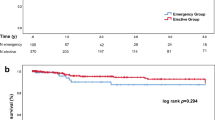Abstract
PURPOSE
Patients who have an emergency operation for colorectal cancer have poorer long-term survival outcomes compared with elective patients. This study was designed to define the role of tumor pathology as a basis for the differences in survival outcomes.
METHODS
There were 1,537 elective and 286 emergency patients who had an operation for bowel cancer from 1997 to 2003. Tumor pathology and survival data collected prospectively for these patients were compared by modes of presentation.
RESULTS
Excluding 30-day mortality, emergency patients as a whole had a five-year all-cause survival rate of 39.2 percent compared with 64.7 percent for elective patients P < 0.0001 they also had more advanced Dukes C and D tumors (P < 0.0001). The rates of early T1 and T2 cancers were 4.7 percent for the emergency and 25 percent for the elective group. Emergency cases had more lymph node-positive patients and N2 patients (57.1 vs. 41.8 percent and 26.6 vs. 15.9 percent, respectively; P < 0.0001). Curatively resected emergency colon patients again had more advanced Dukes staged tumors (P < 0.0001) with a five-year survival rate of 51.6 percent compared with 75.6 percent for elective patients P < 0.0001. On stage-for-stage analysis, the survival rates for curatively resected Dukes B and C colon cancers remained worse for emergency patients (P = 0.003 and P = 0.0002, respectively). Both emergency Dukes B and C groups had more T4 cases (21.5 vs. 10.6 percent; P = 0.017 and 26.4 vs. 15 percent; P = 0.016, respectively).
CONCLUSION
Advanced tumor pathology is a basis for poor long-term survival in emergency colorectal cancers.




Similar content being viewed by others
References
Wong SK, Kneebone A, Morgan M, Henderson CJ, Morgan A, Jalaludin B. Surgical management of colorectal cancer in South-western Sydney 1997–2001: a prospective series of 1293 unselected cases from six public hospitals. ANZ J Surg 2005;75:776–82.
McArdle CS, Hole DJ. Emergency presentation of colorectal cancer is associated with poor 5-year survival. Br J Surg 2004;91:605-9.
Tekkis PP, Prytherch DR, Kocher HM, et al. Development of a dedicated risk-adjustment scoring system for colorectal surgery (colorectal POSSUM). Br J Surg 2004;91:1174–82.
Metcalfe MS, Norwood MG, Miller AS, Hemingway D. Unreasonable expectations in emergency colorectal cancer surgery. Colorectal Dis 2005;7:275-8.
Scott NA, Jeacock J, Kingston RD. Risk factors in patients presenting as an emergency with colorectal cancer. Br J Surg 1995;82:321-3.
Keighley MR, Williams NS. Surgery of anus, rectum and colon. Vol 1. London: WB Saunders Company Ltd., 1993:852-6.
Davis NC, Newland RC. The reporting of colorectal cancer: the Australian clinico-pathological staging system. ANZ J Surg 1982;52:395-7.
UICC. TNM classification of malignant tumors. Berlin: Springer-Verlag, 1987.
Scholefield JH, Robinson MH, Mangham CM, Hardcastle JD. Screening for colorectal cancer reduces emergency admissions. Eur J Surg Oncol 1998;24:47-50.
McGrath DR, Leong DC, Armstrong BK, Spigelman AD. Management of colorectal cancer patients in Australia: the National Colorectal Cancer Care Survey. ANZ J Surg 2004;74:55-64.
Cheung PS, Wong SK, Boey J, Lai CK. Frank rectal bleeding: a prospective study of causes in patients over the age of 40. Postgrad Med J 1988;64:364–8.
Church JM. Analysis of the colonoscopic findings in patients with rectal bleeding according to the pattern of their presenting symptoms. Dis Colon Rectum 1991;34:391-5.
Australian Cancer Network Colorectal Cancer Guidelines Revision Committee. Guidelines for the Prevention, Early Detection and Management of Colorectal Cancer. The Cancer Council Australia and Australian Cancer Network, Sydney 2005. Available at: http://www.nhmrc.gov.au/publications/synopses/cp106/cp106syn.htm. Accessed on December 7, 2007.
Chlebowski RT, Wactawski-Wende J, Ritenbaugh C, et al. Estrogen plus progestin and colorectal cancer in postmenopausal women. N Engl J Med 2004;350:991-1004.
Acknowledgments
The authors thank the South Western Sydney Colorectal Tumour Group for their diligent contribution to the database and the Australian Chinese Foundation and South Western Sydney Bowel Cancer Foundation for funding the establishment of the colorectal database.
Author information
Authors and Affiliations
Corresponding author
Additional information
Reprints are not available.
About this article
Cite this article
Wong, S.K.C., Jalaludin, B.B., Morgan, M.J. et al. Tumor Pathology and Long-Term Survival in Emergency Colorectal Cancer. Dis Colon Rectum 51, 223–230 (2008). https://doi.org/10.1007/s10350-007-9094-2
Received:
Revised:
Accepted:
Published:
Issue Date:
DOI: https://doi.org/10.1007/s10350-007-9094-2




